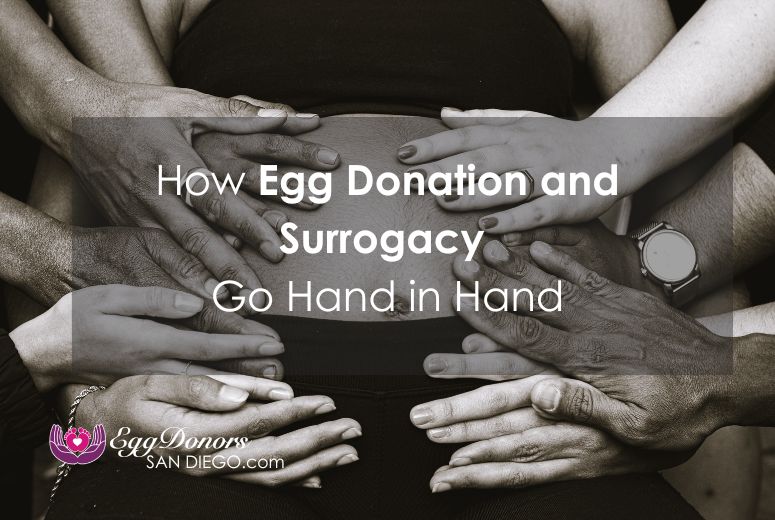When natural conception isn’t possible, intended parents often turn to third-party reproduction—specifically egg donation and surrogacy—to realize their dreams of having a child. While each process can stand alone, together, they form one of the most powerful family-building partnerships in assisted reproductive technology (ART): gestational surrogacy using donor eggs.
In this arrangement, a carefully screened egg donor provides the oocytes (eggs), which are then fertilized via IVF. The resulting embryos are transferred to a gestational surrogate, who carries the pregnancy. The surrogate has no genetic connection to the child, which is essential for both legal clarity and emotional comfort for all involved.
“Egg donation and surrogacy represent not just clinical processes—but journeys of hope and human connection. When aligned correctly, they open the door to parenthood for so many who believed it was out of reach.”
—Dr. Minoos Hosseinzadeh
How the Process Works
Egg Donor Matching and Screening
At EggDonorsSanDiego.com, all donors undergo comprehensive egg donor screening to assess medical history, psychological stability, and genetic background. The egg donor matching process is designed to align with the values and goals of the intended parents. The matching process is assisted by our FISD donor expert to guide you through the process.
Fertilization and Embryo Creation
After egg retrieval and fertilization, embryos are monitored through the development stage of blastocyst and assessed for quality prior to cryopreservation.
Surrogate Selection and Legal Framework
A licensed surrogacy agency or clinic partner assists in identifying a surrogate who meets both medical and emotional qualifications. Someone who you feel safe to work with on this very personal journey. A thorough legal contract is written and agreed upon by all parties involved, covering all of the social, medical and financial aspects of the collaboration. This establishes the legal aspects of surrogacy, such as parentage rights and compensation agreements.
Embryo Transfer and Pregnancy
Through IVF with donor eggs, a lot of careful planning, medication, skilled laboratory technique, and commitment an embryo is transferred to the gestational surrogate, who will carry the pregnancy to term.
Support Throughout the Surrogacy Journey
“Everyone involved in the journey deserves to feel seen. We provide continuous, compassionate support throughout every step—before, during, and after embryo transfer.”
—Dr. Hosseinzadeh
Why They Work So Well Together
Egg donation and surrogacy go hand in hand because they each solve a different part of the fertility equation:
- Egg donation is ideal for those who cannot produce viable eggs.
- Surrogacy is necessary for those who cannot carry a pregnancy.
Together, they provide a seamless path with exceptional pregnancy rates for individuals facing:
- Premature ovarian failure
- LGBTQ+ parenthood
- Uterine factor infertility
- Recurrent pregnancy loss
- Cancer survivors preserving fertility
This powerful synergy has helped thousands build families, especially in destinations like San Diego where fertility clinics and legislation are favorable for third-party reproduction.
Who Benefits Most
- Intended parents with medical or anatomical barriers to conception
- Same-sex male couples and single fathers
- Women with high-risk pregnancy conditions or absent uterus
“We personalize every treatment plan. Our integrated egg donation and surrogacy model removes layers of confusion by offering everything in one place—with one trusted expert.”
—Dr. Hosseinzadeh
Timing and Considerations
When should you consider egg donation with surrogacy?
- After multiple failed IVF cycles
- If advised by a fertility specialist
- When time-sensitive factors like age or health limit options
It’s necessary to have the legal and psychological evaluations to ensure the surrogacy journey is smooth and all parties feel empowered and protected. The fertility center will let you know when each step should be taken and by whom.
Risk Factors and Complications
While both procedures are safe and highly regulated, they do involve risk:
- For egg donors: mild to moderate discomfort from hormone injections, and the egg retrieval process.
- For surrogates: typical pregnancy risks, managed with thorough medical oversight.
- For intended parents: financial and emotional investment, mitigated by transparent expectations and guidance.
Prevention and Legal Protections
The best way to reduce complications is to partner with a clinic that handles:
- In-depth psychological evaluations
- Clear legal contracts
- Medical screening and post-transfer care
EggDonorsSanDiego.com prioritizes ethical guidelines and works closely with legal experts to ensure a seamless, secure experience.
Types of Treatment Available
At the Fertility Institute of San Diego, options include:
- Fresh egg donation
- Gestational surrogacy program
- International coordination for out-of-town intended parents
Costs
The costs of egg donation and surrogacy vary based on donor compensation, surrogate fees, legal expenses, and IVF treatments. At EggDonorsSanDiego.com we offer transparent pricing and financing support.
“We believe that creating a family shouldn’t be an impossible dream. That’s why we’re committed to transparent care and honest conversations.”
—Dr. Hosseinzadeh
FAQs
Traditional surrogacy uses the surrogate’s own egg; gestational surrogacy uses donor eggs or the intended mother’s, with no genetic link to the surrogate.
Yes. You are part of every step in the matching process and will select someone who aligns with your values.
Yes. California is one of the most surrogacy-friendly states in the U.S., with well-defined legal protections.
From donor selection to baby in your arms, the journey may take 18-24 months depending on circumstances. Remember it takes 10 months for a full term pregnancy.
If you’re ready to take the next step in building your family with the help of egg donation and surrogacy, we’re here to guide you—every step of the way.
Book your complimentary virtual consultation with Dr. Hosseinzadeh today.









